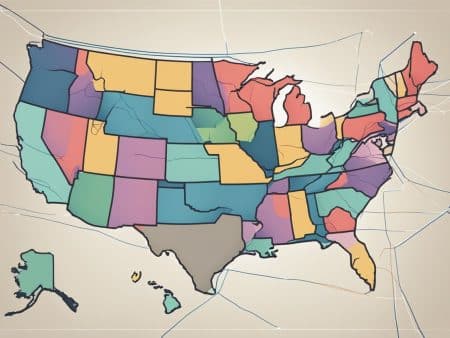Legal online poker for real money exists in just seven American states – New Jersey, Delaware, West Virginia, Pennsylvania, Michigan, Connecticut, and Rhode Island. A radical alteration is taking place as major states advance their online poker legislation. Maryland’s 6.2 million residents, Virginia’s 8.7 million residents, and Illinois’s 12.6 million residents might soon join this list as these states think over legalization.
Money talks when it comes to these legislative moves. Illinois expects to collect between $450 million and $800 million in annual tax revenue from online gaming. New Jersey’s soaring win proves why more states are jumping on board – the state collected $414 million in online gaming tax revenue last year. Louisiana’s underground market tells an interesting story, with players wagering an estimated $4.6 billion illegally each year on online casinos. These new bills could reshape the scene by turning these underground activities into regulated operations that boost state economies.
State-by-State Legislative Progress
States are making ground on legalizing real money online poker. Let’s get into the most promising developments.
Maryland’s House Bill 17 Analysis
Maryland’s House Bill 17, which Delegate Vanessa Atterbeary introduced, sits with the House Ways and Means Committee for review. The bill gives the State Lottery and Gaming Control Commission power to regulate and license internet gaming operations. It also has provisions for multi-jurisdictional agreements that could let players compete across state lines.
Virginia’s Online Gaming Framework
Virginia stands out with Senate Bill 827’s business-friendly approach to online gaming. Each casino license can have up to three online gaming platforms with a 15% tax rate on revenue. This setup could bring nine different brands to the state, and the number might grow to fifteen once all planned casinos open their doors.
Illinois and Louisiana Proposals
Illinois will see another push in 2025 when State Rep. Edgar Gonzalez Jr. brings back his legislation. Louisiana’s Senate committees plan to meet later this year to talk about online casino gaming options. Both states must deal with brick-and-mortar casino operators who worry about losing revenue to online platforms.
Key State Proposals Comparison:
| State | Bill Number | Tax Rate | Notable Feature |
|---|---|---|---|
| Virginia | SB827 | 15% | Up to 3 skins per casino |
| Maryland | HB17 | TBD | Multi-state gaming provisions |
| Illinois | Upcoming | 15% proposed | Previous bill had 3 skins |
Regulatory Framework and Requirements
The regulatory framework for best online poker real money operations shows clear patterns across states.
Proposed Tax Structures
States now offer competitive tax rates that attract operators and generate revenue. The National Council of Legislators from Gaming States suggests new jurisdictions should aim for 15% to 25% tax rates. West Virginia keeps it simple with a 15% rate. Pennsylvania takes a different approach with a tiered system that goes up to 54% for some games. Rhode Island splits it up – 50% on slots and 18% on table games.
Licensing Requirements
Each jurisdiction demands strict licensing criteria. The core team needs to meet these requirements:
- Proof of financial stability and detailed business plans
- Background checks for key personnel
- Technical compliance certification
- Anti-money laundering protocols implementation
Consumer Protection Measures
Player safeguards have become stronger than ever. States limit daily deposits to USD 20,000 and don’t allow credit card deposits to stop excessive gambling. On top of that, operators need these systems in place:
- Age verification systems (21+ in most states)
- Location verification technology
- Self-exclusion programs
- Problem gambling resources
The Michigan Gaming Control Board leads by example and ensures fair gaming that protects state residents. These measures create a secure space for best online poker real money sites without compromising operational integrity.
Impact on States You Can Online Gamble
Online poker real money operations have transformed state economies remarkably. Consumer spending in commercial gaming reached USD 60.46 billion in 2022, showing a 14% increase.
Projected Revenue Generation
Revenue generation possibilities look promising. Legal online casino gaming throughout the U.S. could bring USD 15 billion yearly in tax revenue to states and tribes. Seven states with legal online gaming produced USD 1.61 billion in tax revenue last year.
Education Funding Allocation
Online gaming revenue has become education’s biggest ally. Legal gambling in Michigan generated about USD 500 million in tax revenue for the state School Aid Fund. Without doubt, online gambling contributed much of this amount – 80% (USD 400 million).
Key Education Funding Success Stories:
- New York leads the nation in per-pupil education funding
- Michigan’s education sector received USD 2.50 billion over 25 years
- New York allocates 80% of gaming revenue to elementary and secondary education
Economic Development Opportunities
Economic benefits go well beyond direct tax revenue. The global online gaming market should reach USD 127 billion by 2027. States with legal frameworks show:
| Market Growth Indicators | Effect |
|---|---|
| Commercial Gaming Tax | USD 13.49 billion to state/local governments |
| State Records | 27 of 35 states set annual revenue records |
| Sports Betting Growth | 61.1% year-over-year increase to USD 7.50 billion |
Interstate Poker Possibilities
The Multi-State Internet Gaming Agreement (MSIGA) is the life-blood of online poker real money expansion in the United States. The growth in interstate poker possibilities has been remarkable, especially when West Virginia became the fifth member in November 2023.
MSIGA Expansion Potential
MSIGA membership has grown steadily since it started. Delaware and Nevada launched the compact in 2014. New Jersey joined in 2017, Michigan in 2022, and West Virginia in 2023. These five states have a combined population of:
| State | Population |
|---|---|
| Michigan | 10.0 million |
| New Jersey | 9.3 million |
| Nevada | 3.2 million |
| West Virginia | 1.8 million |
| Delaware | 1.0 million |
Cross-Border Player Pools
Shared liquidity between states brings great benefits. Two major operators now use interstate markets:
- PokerStars combines player pools between Michigan and New Jersey
- WSOP.com offers shared platforms across Nevada, Michigan, and New Jersey
Market Size Projections
Best online poker real money sites have a bright future ahead. The global online poker platform market hit USD 96.2 billion in 2023. Experts predict growth to USD 213.25 billion by 2032, with a compound annual growth rate of 12%. North America, especially the U.S., dominates the market.
Growth potential looks even more promising with Pennsylvania’s expected entry into MSIGA. Pennsylvania would add 13 million residents to the shared player pool as the largest state among current and potential MSIGA members. This addition would boost the total MSIGA population to about 38.3 million residents.
Conclusion
American online poker for real money stands at a turning point in gaming history. New state laws could add more than 27 million people to the legal player base. These numbers paint an exciting future for the industry.
New Jersey’s success story shows $414 million in tax revenue, which proves that regulated online poker works. Michigan has contributed $400 million to education, showing how gaming money helps local communities directly.
The rules have changed by a lot. States now use detailed frameworks that work well for operators and protect players. Daily deposit limits, age checks, and help for problem gambling create a safe space where players can enjoy the game.
MSIGA keeps growing stronger with five states now sharing their player pools. If Pennsylvania joins in, the combined player base would reach 38.3 million residents. This means bigger tournaments and better competition for everyone.
States that think over legalization can learn from markets that already exist. The proof shows that regulated online poker brings in good tax money, supports education programs, and creates jobs. Players stay protected through careful oversight.



